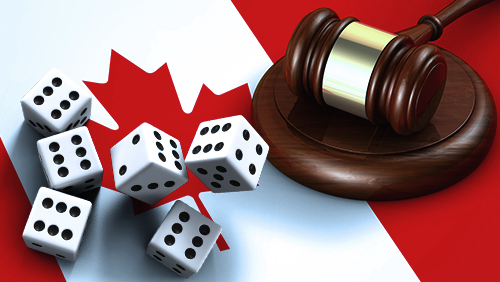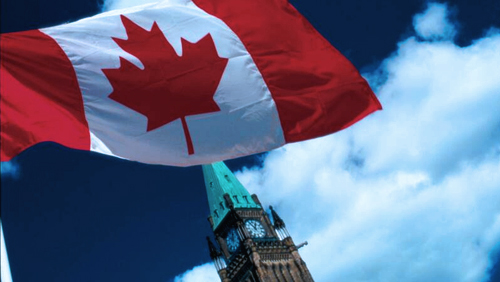This is a guest contribution by Johnny Jaswal, Managing Director of the Jaswal Institute. If you require further information, please contact Johnny Jaswal.
If you would like to submit a contribution please contact Bill Beatty for submission details. Thank you.
Many people would be surprised to hear that, in 1985, the federal government announced an agreement that would effectively exclude the federal government from lotteries and lottery schemes. For 100 million dollars, to be directed towards the 1988 Winter Olympics, and reaffirmation of an agreement to make annual payments of 24 million dollars, indexed to the CPI, the federal government agreed to amend the Criminal Code, no later than December 31, 1985, to grant the provinces exclusive authority, either alone or in conjunction with the government of another province, to conduct and manage lottery schemes in accordance with any laws enacted by the legislature of that province.
The abovementioned arrangement is substantial for several reasons. The expressions lottery and lottery schemes are legally interpreted broadly and incorporate additional forms of gambling and games of chance including betting on sports, bingo, card games such as poker and, potentially, fantasy sports if the activity is eventually caught by the Canadian Criminal Code as a game of chance or a game of mixed chance and skill.
In addition, buried with agreement and amendments is now section 207(4)(c) of the Criminal Code, which gives the provinces exclusive jurisdiction to conduct and manage lotteries or games of chance on or through a computer.
Despite the significance and implications of the agreement and amendments, they received, and continue to receive, little attention and public discussion. It is the Jaswal Institute’s view that coming developments, outlined below, are going to bring significant examination of the current state of gambling laws.
The Current State of Online Gambling – Foreign Operator Principle
 With respect to online gambling in Canada, provincial gambling corporations have been unable to effectively dissuade the population from gambling on non-government websites. In the view of the Jaswal Institute, though provincial governments consider non-government offerings illegal, the legality of websites operating outside of Canada has been established through the foreign operator principle, allowing operators to successfully compete against provincial gambling corporations.
With respect to online gambling in Canada, provincial gambling corporations have been unable to effectively dissuade the population from gambling on non-government websites. In the view of the Jaswal Institute, though provincial governments consider non-government offerings illegal, the legality of websites operating outside of Canada has been established through the foreign operator principle, allowing operators to successfully compete against provincial gambling corporations.
In summary, the foreign operator principle is fundamentally a jurisdictional position based on section 6 of the Canadian Criminal Code, which generally holds that no person shall be convicted of an offence committed outside of Canada.
By minimizing or eliminating connections with Canada, for example via locating download, database and gaming servers outside of Canada in gambling friendly jurisdictions, foreign operators take the position that they are not susceptible to the gambling provisions in Part VII of the Criminal Code given the legal nexus required to attract jurisdiction of the Criminal Code is not present. The foreign operator principle derives practical support from the Starnet case as the case demonstrates prosecutorial willingness to target operations with a legal nexus to Canada and an analogous lack of interest in engaging entities that minimize or eliminate connections with Canada.
In Starnet, following a plea agreement, the business made changes to its corporate structure to minimize connections with Canada that allowed it to avoid further targeting by Canadian authorities. The foreign operator principle was emphasized in the Observations to the Fourth Report of the Standing Senate Committee on Legal and Constitutional Affairs (Bill C-13).
In response to concerns expressed by a witness of the potential extra-territorial application of a clause of Bill C-13, which dealt with the transmission and reception of information relating to book-making, betting and wagering, among other things, the Committee clarified that the intent of the clause was not to extend jurisdiction and thus the clause would not have extra-territorial application. Though the commentary relates to a specific amendment, it provides insight with respect to Parliamentary intent regarding gambling laws.
The Future of Online Gambling
 There is no doubting the significant financial opportunities in the online gambling space as it has progressed into a multibillion-dollar global industry with significant upside. To that end, as governments are unable to compete with non-government offerings and are realizing that online gambling is a source of revenue that is eluding them, they are making major moves that will significantly alter the gambling landscape in Canada.
There is no doubting the significant financial opportunities in the online gambling space as it has progressed into a multibillion-dollar global industry with significant upside. To that end, as governments are unable to compete with non-government offerings and are realizing that online gambling is a source of revenue that is eluding them, they are making major moves that will significantly alter the gambling landscape in Canada.
The developments can be inferred from Quebec’s 2015-2016 budget and a report by the Working Group on Online Gambling, created by Quebec’s former Minister of Finance Raymond Bachand and chaired by Dr. Louise Nadeau. Though the report deals primarily with Quebec, Jaswal Institute relationships suggest that other provinces are working with Quebec to implement similar structures, which should sound alarms internationally and across Canada.
In summary, the report by the Working Group on Online Gambling recommended taking the necessary steps to amend the Criminal Code to enable the Canadian provinces to issue online gambling licences to private operators. Jaswal Institute research suggests that Quebec Finance Minister Carlos Leitao has contacted other provinces to consult on amending the Criminal Code and issuing private operator licenses.
However, given the challenges linked to the amendment of the Criminal Code, in the short term, the report recommended exploring the possibility of offering the games of private operators to online gamblers exclusively through a government website/portal, a recommendation which will be implemented in the near future according to Quebec’s 2015-2016 budget.
As highlighted in the report, in this model, the government will establish and operate a portal through which it will exclusively offer the online games of chance and gambling games of private operators to provincial gamblers under a contractual agreement with private operators.
As an example of how this would work, the websites of contracted private operators, for example PokerStars, would be deemed “illegal.com” to provincial gamblers and those provincial gamblers would be redirected to the government portal, which would offer the games of PokerStars.
To add policing capacity to efforts to control online gambling, the report discussed the filtering of illegal sites as evidence suggests that a portal alone is insufficient in respect of the online gambling market. Accordingly, as a subsidiary measure to the portal model, through tabled legislation, Quebec has decided to move forward with a plan to order Internet service providers to block a list of unlicensed gambling websites to be drawn up by Loto-Quebec, which will shut down those that are not invited to the provincial portal party.
Through this brilliant structure, provincial governments will absorb competitors and force player migration to the provincial portals, thus significantly increasing provincial gambling revenues. As discussed above, given the fact that other Canadian provinces are reportedly following Quebec’s lead, this should ring the alarm internationally and across the nation.
Stakeholders – Foreign Operators, the Federal Government and First Nations Communities
 Though the provincial measures arguably bring clarity to the grey areas of the Criminal Code, the provincial plans have significant consequences and serious implications for stakeholders in the online gambling space; most notably foreign operators, the federal government and First Nations communities. As we have discussed foreign operators above, we will discuss the federal government and First Nations communities.
Though the provincial measures arguably bring clarity to the grey areas of the Criminal Code, the provincial plans have significant consequences and serious implications for stakeholders in the online gambling space; most notably foreign operators, the federal government and First Nations communities. As we have discussed foreign operators above, we will discuss the federal government and First Nations communities.
As discussed above, given the fact that the federal government traded away its gambling jurisdiction to the provincial governments for cash payments, its stake in online gambling has essentially been reduced to collecting annual payments of 24 million dollars, indexed to the CPI; which according to our calculations, amounted to approximately 70 million dollars in 2015.
In our view, the federal government traded away significant future revenue potential for relatively nothing; a trade that reminds us of a tragic day in Toronto history, the trade of Vince Carter, a.k.a. Air Canada, a.k.a. Vinsanity, a.k.a. Half-Man, Half-Amazing.
For those not familiar with the trade, which in our view was the worst trade in NBA history, the Raptors traded away the future of the franchise to a division rival for a package of inconsequential players and draft picks, including a player that refused to report in Toronto, forcing the Raptors to buy out his contract.
In the same way the Vince Carter trade haunted the Raptors franchise, the federal government’s trade of its gambling jurisdiction to the provinces, for what relatively amounts to petty cash, will soon haunt the federal government as the extent of the lopsided trade will soon become painfully apparent as the federal government watches the provincial dollars roll in.
The next stakeholders in the online gambling space are First Nations communities, operating on First Nations land, that assert their rights to self-govern as sovereign nations. An example is the Mohawk community of Kahnawake, on the South Shore of Montreal, which has established the Kahnawake Gaming Commission (“KGC”) to regulate online gambling. The Mohawk community of Kahnawake, via the KGC, has become a model enterprise through, for example, its establishment of comprehensive gambling regulations and an advanced server park.
It is important to highlight that though First Nations communities assert their rights to self-govern as sovereign nations, according to the Government of Canada’s Federal Policy Guide to Aboriginal Self-Government, the inherent right of self-government will not result in sovereign independent aboriginal nation states as the inherent right of self-government does not include a right of sovereignty in the international law sense.
In contrast, the Government of Canada recognizes the inherent right of self-government as an existing aboriginal right under section 35 of the Constitution Act, 1982. Accordingly, it can be argued that section 35 recognizes the inherent right of the Mohawks of Kahnawake to govern themselves in relation to gambling as a matter that is internal to their communities, integral to their unique cultures, identities, traditions, languages and institutions, and with respect to their special relationship to their land and their resources.
Though it has been argued that the inherent right of the Mohawks of Kahnawake to govern themselves in relation to gambling is recognized as an existing aboriginal right given the failure of both the federal and provincial governments to challenge this activity, Canadian authorities have stated that they do not recognize the KGC regulatory agency.
As stated in the report by the Working Group on Online Gambling, the KGC appears to have “operated with impunity” since its creation, leading to several allegedly “illegal online gambling websites” hosted in the territory of Kahnawake. To that end, given the KGC licenses and regulates websites operated through servers physically located on First Nations land, based on the position of Canadian authorities, the Mohawks of Kahnawake are allegedly violating the Criminal Code and are thus potentially leaving themselves open to action by provincial and federal governments.
We hypothesize that delayed action against the Mohawks of Kahnawake may be attributed to the inaction with respect to Amaya, whose operations are legally tenuous given its physical presence in Canada. In other words, it would be an uneven application of the law to challenge the operations of the Mohawks of Kahnawake if the same pressure is not applied to Amaya.
However, given the fact that the portal proposal – in which the government will establish and operate a portal through which it will exclusively offer the online games of chance and gambling games of private operators to provincial gamblers under a contractual agreement with private operators – will effectively greenlight Amaya’s operations given Amaya’s rumored VIP invitation to the government’s portal party, the Mohawks of Kahnawake will no longer have Amaya as shield. Accordingly, the Mohawks of Kahnawake, and other First Nations communities, should anticipate a movement to challenge their operations.
Regarding the legal hurdles and strategies below, First Nations communities have the option to negotiate or enforce their inherent right of self-government through the courts, as the Government of Canada acknowledges that there are different views about the nature, scope and content of the inherent right. However, this option is highly political, lengthy and costly. We will focus on more general options and strategies that apply to all stakeholders.
Legal Hurdles and Strategies
 The stakeholders discussed above, specifically foreign operators and First Nations communities, have several hurdles to overcome.
The stakeholders discussed above, specifically foreign operators and First Nations communities, have several hurdles to overcome.
The first hurdle is the provincial government’s planned filtering of illegal sites. As discussed above, Quebec has decided to move forward with a plan to order Internet service providers to block a list of unlicensed gambling websites to be drawn up by Loto-Quebec, which will shut down those that are not invited to the provincial portal party.
The filtering of websites will face significant legal challenges on free speech and jurisdictional grounds as telecommunications regulation is the exclusive jurisdiction of the federal government. Further, as noted by Dr. Michael Geist, a law professor at the University of Ottawa, the legal challenge may not be limited to constitutional issues as the Quebec bill regarding website blocking may also be barred by the Trans-Pacific Partnership (“TPP”), which requires countries to treat service providers equally, irrespective of which country they are from.
As Canada did not carve out an exception for gambling, similar to Australia, Singapore and Mexico, due to the fact that gambling falls under provincial jurisdiction, the website blocking plan, as a protectionist mechanism to increase local service provider revenues, would have difficulty overcoming the TPP barriers.
Assuming that the website blocking legislation is withdrawn or successfully challenged, stakeholders should anticipate a second wave.
As stated above, the online gambling space has progressed into a multibillion-dollar global industry with significant upside. To that end, the Jaswal Institute expects the provincial governments will be ready and willing to go to war to assert their legal monopoly over online gambling.
We anticipate this wave would focus on attacking the foreign operator principle. As stated above, by minimizing or eliminating connections with Canada, for example via locating download, database and gaming servers outside of Canada in gambling friendly jurisdictions, foreign operators take the position that they are not susceptible to the gambling provisions in Part VII of the Criminal Code given the legal nexus required to permit jurisdiction of the Criminal Code is not present.
Though this position has been practically supported in Starnet, the Libman Supreme Court decision rules that the Canadian courts have jurisdiction when a significant portion of a given offence is committed in Canada. To that end, the requisite legal nexus for an offence under the Criminal Code may be established, for example, via a court concluding that a significant portion of an offence has been committed in Canada due to a provider aiming offerings at Canadian gamblers, a provider accepting bets from Canadian gamblers or the fact that games are being played on computers of Canadian gamblers. This wave will be tougher to overcome so a prudent approach for stakeholders would be to fill their legal war chests.
To that end, the Jaswal Institute thought that it would be an opportune time to resurrect an old argument that is highly relevant today; what was old is new again. We would like to thank Judith A. Osborne, Colin S. Campbell, Timothy F. Hartnagel and Garry J. Smith, whose articles were used as a foundation for our analysis, and Peter W. Hogg, a leading constitutional law scholar, whose writings were helpful in shaping our constitutional position.
In essence, the legal position is based on the questionable constitutional validity of the agreement, announced by the federal government in 1985, which effectively excluded the federal government from lotteries and lottery schemes.
For 100 million dollars, to be directed towards the 1988 Winter Olympics, and reaffirmation of an agreement to make annual payments of 24 million dollars, indexed to the CPI, the federal government agreed to amend the Criminal Code to grant the provinces exclusive authority, either alone or in conjunction with the government of another province, to conduct and manage lottery schemes in accordance with any laws enacted by the legislature of that province.
Leaving aside the public policy, ethical and moral concerns with respect to the federal government making Criminal Code amendments and decriminalizing otherwise criminal actions for cash from the provinces, as the regulation of lotteries and gaming is the responsibility of the federal government, did the transfer of regulatory control of gambling to the provinces constitute improper use of federal criminal law power and, if so, should this result in Section 207 of the Criminal Code being struck down?
The Jaswal Institute suggests that the transfer of regulatory control of gambling to the provinces constituted improper use of federal criminal law power and, accordingly, the invalid actions should result in Section 207 of the Criminal Code being struck down. Section 91 of the Constitution Act, 1867, which deals with the legislative authority of the Parliament of Canada, states that criminal law is within “the exclusive Legislative Authority of the Parliament of Canada”, which would support the view that inter-delegation of powers between the Parliament and a provincial legislature is prohibited.
Nevertheless, the courts have carved out exemptions, for example referential and conditional legislation, to allow cooperation between the Parliament and provincial legislatures.
To summarize the applicable exemptions created by the courts, “there is no unconstitutional delegation involved where there is no enlargement of the legislative authority of the legislature, but rather acts or the mere borrowing of provisions which are within provincial competence, which have independent provincial validity and significance and which the acting or referring legislature could have performed or validly spelled out for its own purposes” (Abel, Campbell, Hogg, Osborne).
As gambling is exclusively within the jurisdiction of federal criminal law power, the section 207 gambling laws of the Criminal Code enlarge the legislative authority of the provincial legislatures and but for the terms of section 207 – which explicitly grant the provinces exclusive authority, either alone or in conjunction with the government of another province, to conduct and manage lottery schemes in accordance with any laws enacted by the legislature of that province – enacting laws and creating exemptions from the general prohibitions are not within provincial competence and do not have independent provincial validity and significance; further, the provincial legislatures could not have acted or validly spelled out provisions for their own purposes.
In other words, the provinces acquired powers not constitutionally authorized. To that end, we would argue that section 207 constitutes an invalid inter-delegation which should be examined by the Supreme Court.
Given our position regarding an invalid inter-delegation, there is the potential of provincial litigation against the federal government based on a clause in the 1985 agreement, in which federal government traded away its gambling jurisdiction to the provincial governments for cash payments, which states “[the] agreement may only be amended or terminated by the unanimous consent of the Provinces and the Government of Canada”. If it does get to this point, there is an excellent argument summarized by Judith A. Osborne & Colin S. Campbell that, based on the legal opinion of counsel sought by the Senate Committee, the 1985 contract was not legally binding and merely a political arrangement.
Conclusion
Our legal position above highlights an option for stakeholders that may soon find themselves out of business in Canada. The position is simple. If you are not invited to the provincial portal party, why not crash it and shut it down by challenging the delegated provincial jurisdiction to regulate gambling. If you are lucky, in the aftermath, you may find a new party with a better spot on the dance floor.
Leaving the invalid inter-delegation and questions regarding the constitutional validity of section 207 aside for the moment, similar to our support with respect to the legalization of marijuana, the delegation of gambling jurisdiction to the provincial governments should weaken the notion of gambling as a matter under criminal law jurisdiction. As we have argued in the past, and do not mind repeating, our government must clarify laws and pursue policy objectives that increase innovation and attract competitive businesses to our country.
Clarifying the legal grey areas with respect to online gambling would create innovative businesses that attract capital to Canada. Similarly, given the federal Liberals have promised to allow recreational use of marijuana, the recreational marijuana industry is another example of a new and innovative market that can be created through liberalization and legalization.
As Canada has established a progressive regulatory environment for marijuana, we have the opportunity to be an international leader in the marijuana space; thus, similar to online gambling, creating innovative businesses that attract capital to Canada and promote innovative environments.
We need liberalization with respect to industries such as gambling and marijuana, which would increase innovative goods and services and, consequently, growth and competitiveness. Not only would this lead to better living standards for our nation’s citizens, but it creates the possibility of the emergence of strong Canadian global players, who could then expand into foreign countries, increasing the sovereign power of our nation.
As the distinction between countries gets smaller and we increasingly move towards a borderless state, it is vital that Canada act and compete before the world makes the decision for us and renders us unable to emerge as the dominant nation we are.
Authored by Johnny Jaswal, Managing Director of the Jaswal Institute. The Jaswal Institute is a law firm that provides exceptional legal services and a full range of related investment banking advisory services. For more information, please visit http://jaswalinstitute.com/. If you would like to submit a contribution please contact Bill Beatty for submission details. Thank you.